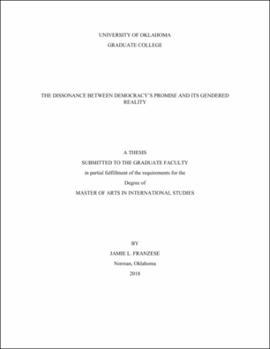| dc.description.abstract | In international development discourse and political science literature, there appears to be consensus that democratic governance contributes to gender equality. As a result, democracy and women’s rights are often articulated as complementary development objectives. However, empirical studies grounded in feminist international relations scholarship argue that liberal democratic governance is not a necessary nor a sufficient condition for creating gender equality. This thesis asks what can explain this discord between democracy’s promise and its gendered reality. In response to this ambitious research question, I argue that the even though women do indeed benefit from the civil and political rights associated with the democratic governance, they do so at a slower rate than men. Therefore, I hypothesize that democratic governance alone does not alleviate underlying patriarchal social norms.
This thesis assesses the political, economic, and social components of gender equality in three Latin American countries with different relationships to liberal democracy. The comparative analysis of Costa Rica, an established democracy, Chile, a recently formed democracy, and Cuba, an established authoritarian regime, indicates preliminary support for the argument that democracy unequally advantages men. The findings of this thesis imply that there is an intervening variable, which transcends regime types and impacts gender equality. As such, this thesis emphasizes the need for scholars and policy analysts to continue to research the relationship between regime type and women’s issues. | en_US |
